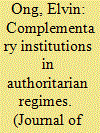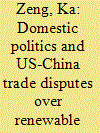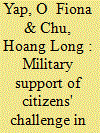| Srl | Item |
| 1 |
ID:
142075


|
|
|
|
|
| Summary/Abstract |
Recent political science research has suggested that autocrats adopt a variety of institutions such as nominally democratic elections and ruling parties to buttress authoritarian durability. In this article I investigate the role of constituency service in an authoritarian regime. I argue that Singapore's Meet-the-People Sessions (MPS) is a complementary institution that can serve to mitigate the weaknesses of other authoritarian institutions, thereby entrenching authoritarianism, rather than serve as a form of democratic representation. First, it is a mechanism to gain valuable everyday information about grievances within the population, thereby allowing the ruling People's Action Party (PAP) to formulate policies and effectively target its response. Second, it is a convenient venue to recruit and socialize ordinary party members, thus helping the PAP forestall potential party decay. Symbolically, conducting MPS is a material performance of the hegemonic ideology of elitism between PAP politicians and ordinary Singaporeans.
|
|
|
|
|
|
|
|
|
|
|
|
|
|
|
|
| 2 |
ID:
142077


|
|
|
|
|
| Summary/Abstract |
In this article I draw on the two-level game approach to analyze the influence of domestic politics on US-China trade disputes in alternative energy, especially in solar energy. I suggest that the difficulty Washington faces in getting China to address market access barriers in alternative energy needs to be viewed in light of both the coalitional dynamics in the United States resulting from the specific bilateral trade and investment relationship in this sector and Beijing's willingness to use industrial policy to foster economic competitiveness in nascent industries. Specifically, as China occupies the middle of the supply chain in the solar industry, both downstream users of low-cost Chinese imports and exporters of upstream products to China have voiced strong concerns about US trade action. Such domestic opposition, coupled with the importance of industrial policy for defending the country's long-term interests in a “strategic emerging” sector such as alternative energy, substantially constrains Washington's ability to influence Chinese policies.
|
|
|
|
|
|
|
|
|
|
|
|
|
|
|
|
| 3 |
ID:
142074


|
|
|
|
|
| Summary/Abstract |
In this article I explore how the current first-past-the-post (FPTP) rules contributed to the failure of ethnic compromise during the democratic period (1948–1962) in Myanmar by encouraging extremist parties, hardening ethnic divisions, and causing political deadlock, ironically the same charges the centripetal school lays against proportional representation (PR). This puzzle of “PR outcomes” under FPTP is explained using geographic information systems techniques that map the country's 2010 electoral districts onto an ethnic population map. It shows that ethnic party success in the 2010 election closely follows the distribution of ethnic groups in Myanmar and that given the high level of ethno-geographic segregation in Myanmar the representation of ethnic parties would be similar under PR and the alternative vote to the current FPTP. I conclude by discussing Indonesia's electoral rules as a possible solution for Myanmar. The general theoretic contribution is that, although past scholars have generally argued that FPTP is bad for ethnically divided societies, their mechanisms are incorrect for ethno-geographically segregated societies.
|
|
|
|
|
|
|
|
|
|
|
|
|
|
|
|
| 4 |
ID:
142076


|
|
|
|
|
| Summary/Abstract |
When do militaries in the newly industrialized countries of East and Southeast Asia support their governments, when do they support citizens' challenge of government, and when do they launch coups? We propose and test a theory of military behavior using data from across East and Southeast Asia between the 1970s and 2008. The results corroborate the model's predictions to make four contributions: First, the model provides a framework of military behavior for countries to expand study beyond coups or the absence thereof. Second, the findings bring to focus the influence of citizens on the military's behavior, an aspect largely overlooked in scholarship of the region. Third, the necessary conditions—weak economy and galvanized citizens' challenge— that affect the military's behavior vis-à-vis citizens and the government highlight the strategic interaction treatment. Fourth, this study broadens systematic treatment to enrich empirics and theory-building for the political economies of these countries.
|
|
|
|
|
|
|
|
|
|
|
|
|
|
|
|
| 5 |
ID:
142078


|
|
|
|
|
| Summary/Abstract |
We analyze and compare three separate efforts to code bias in Malaysia's media and find strong empirical evidence of an ongoing and profound progovernment bias in coverage. We also find, however, significant variation in bias between different types of news outlets. While Malay and Anglophone sources tended to be strongly progovernment, Chinese-language and online outlets were far more impartial. We demonstrate that both the general bias and the variation in it are largely the result of two factors: (1) government censorship and (2) ownership structures that link many major outlets to the ruling coalition. These findings provide a detailed view of the struggle for media independence in a less-than-democratic regime and supply insight into media bias across both authoritarian and democratic regimes in Asia, as well as outside it.
|
|
|
|
|
|
|
|
|
|
|
|
|
|
|
|